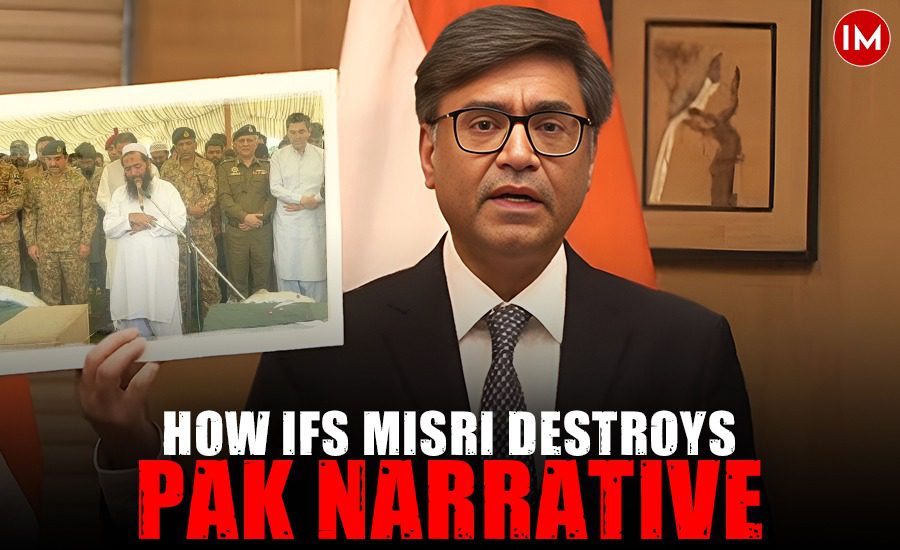New Delhi: In a strong and unequivocal message, Foreign Secretary Vikram Misri, an IFS (Indian Foreign Service) officer of 1989 batch, accused Pakistan of perpetuating a legacy of falsehoods since its inception, as he addressed a press conference held by the Ministry of External Affairs (MEA) for the second consecutive day. He was joined by Army Colonel Sophia Qureshi and Air Force Wing Commander Vyomika Singh, who also briefed the media on India’s military response under Operation Sindoor.
India Not Escalating, Only Responding to Terror Attacks: Misri
Foreign Secretary Misri reiterated that India is not seeking to escalate tensions, but is acting strictly in response to the April 22 terrorist attack. He emphasized that India’s targets were terror hideouts only, and Pakistani military installations were not touched.
“We are not escalating. We are responding,” Misri stated. “The lies began with Pakistan’s birth. In 1947, it told the UN that Kashmir was attacked by tribal forces. But Indian forces witnessed Pakistani troops. This culture of denial and deceit is 75 years old.”
On Claims of Jet Shootdowns: ‘Official Confirmation at the Right Time’
Responding to Pakistan’s claims of having shot down Indian fighter jets, Misri stated, “At the appropriate time, you will receive an official statement.” He underlined that Pakistan’s claims were part of a propaganda campaign, aimed at misleading its own people and the international community.
He further added, “The lies began the day Pakistan was born.” Recalling the events of 1947, Misri explained that Pakistan had informed the United Nations that Kashmir was attacked by tribal forces, when in fact Indian troops had witnessed the presence of the Pakistani Army.
“The journey of falsehood began 75 years ago,” he said, stressing that Pakistan’s current claims are part of the same legacy of deception and propaganda.
Photos, Flags, and Terror Funerals: Evidence of State Complicity
Backing India’s claims with visual proof, Misri displayed photographs from terrorist funerals, where Lashkar-e-Taiba commander Hafiz Abdul Rauf was seen buried with full honors and Pakistani flags. “If only civilians were killed, why were Pakistani Army officers present? Why were terrorists given state honors?” he asked.
TRF Claim Contested
The Foreign Secretary stated that Pakistan has been involved in terrorist attacks on Indian soil for decades and continues to mislead the international community. He pointed out that several globally designated terrorists, including Masood Azhar and Hafiz Saeed, are freely operating from Pakistani territory. He also highlighted that terrorist organizations such as Lashkar-e-Taiba and Jaish-e-Mohammed continue to flourish under Pakistan’s protection.
He stated that The Resistance Front (TRF), widely believed to be a front for the Pakistan-sponsored terrorist group Lashkar-e-Taiba, had claimed responsibility for the Pahalgam terror attack. India had shared this information with the United Nations Security Council (UNSC). However, when the UNSC proposed issuing a statement on the Pahalgam attack, Pakistan objected to including TRF’s name in the draft – despite TRF having publicly claimed responsibility for the attack twice.
Colonel Qureshi: 15 Indian Military Bases Targeted, Pakistan Was Responded to Firmly
Colonel Sophia Qureshi disclosed that Pakistan had attempted attacks on 15 Indian military installations, which were successfully intercepted and neutralized. In response, India targeted and neutralized Pakistan’s air defence system in Lahore, as part of Operation Sindoor.
Wing Commander Vyomika Singh and Colonel Qureshi jointly briefed the media – marking the first time in Indian history that female officers from the Army and Air Force jointly addressed a press conference on an operational military strike.
Operation Sindoor: 9 Targets Neutralized in 24 Minutes
On May 7, the government detailed Operation Sindoor, revealing that nine terror-linked targets were destroyed within just 24 minutes, between 1:04 AM and 1:28 AM, underscoring the precision and swiftness of India’s military response.
India to Withdraw from Indus Water Treaty
Misri also touched upon India’s long-standing engagement with Pakistan under the Indus Waters Treaty, stating that despite multiple attempts at resolution and India’s respect for the agreement over six decades, Pakistan continued to violate its terms.
“India honored the treaty even during wars. But repeated terror attacks and disregard from Pakistan have made its continuation untenable,” Misri said, confirming India’s decision to terminate the treaty after two years of unresolved dialogue.
Pakistan’s Propaganda on PoK Dam Denied
Responding to allegations that India targeted a dam in Pakistan-occupied Kashmir, Misri categorically denied the claim. “We have only targeted terrorist infrastructure. This is another falsehood aimed at justifying retaliatory strikes on Indian civilian infrastructure. Should that happen, India will respond with strength.”
About Vikram Misri
Mr Misri was born on 7 November 1964 in Srinagar, in the Kashmir Valley of Jammu and Kashmir, into a Kashmiri Pandit family. He attended Burn Hall School and DAV School in Srinagar, followed by Carmel Convent School in Udhampur, in the Jammu division. He later studied at The Scindia School in Gwalior, Madhya Pradesh.
Mr Misri became India’s Foreign Secretary in July 2024, bringing with him decades of diplomatic and strategic experience. Known as a “China expert,” he served as Ambassador to China during the Galwan clashes and later as Deputy National Security Advisor. He has been a trusted aide in the Prime Minister’s Office (PMO) under three Prime Ministers – I.K. Gujral, Dr. Manmohan Singh, and Narendra Modi – and played key roles in Pakistan, Myanmar, and during the COVID-19 crisis.
His international postings include Belgium, Spain, the U.S., and several other countries. Before joining the IFS, Misri began his career in advertising and holds degrees from Hindu College (History Honours) and XLRI Jamshedpur (MBA).
His first overseas visit as Foreign Secretary was to Bhutan, reinforcing India’s “Neighbourhood First” policy. He now faces the challenge of balancing India’s strategic autonomy amid global tensions – particularly regarding Russia and China – while steering India’s foreign policy through a crucial period.
































